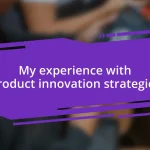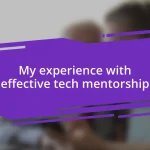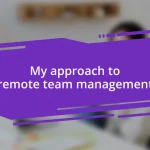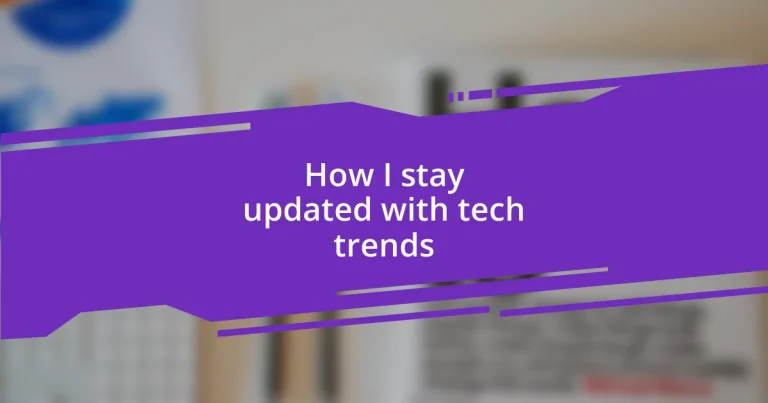Key takeaways:
- Identifying reliable tech sources involves checking the author’s credibility and favoring established publications like Wired and TechCrunch for in-depth insights.
- Subscribing to curated tech newsletters enhances daily updates and engagement with the tech community, fostering ideas and conversations.
- Participating in tech communities and events, along with using trend tracking tools, enables deeper learning, networking, and access to diverse perspectives on emerging trends.
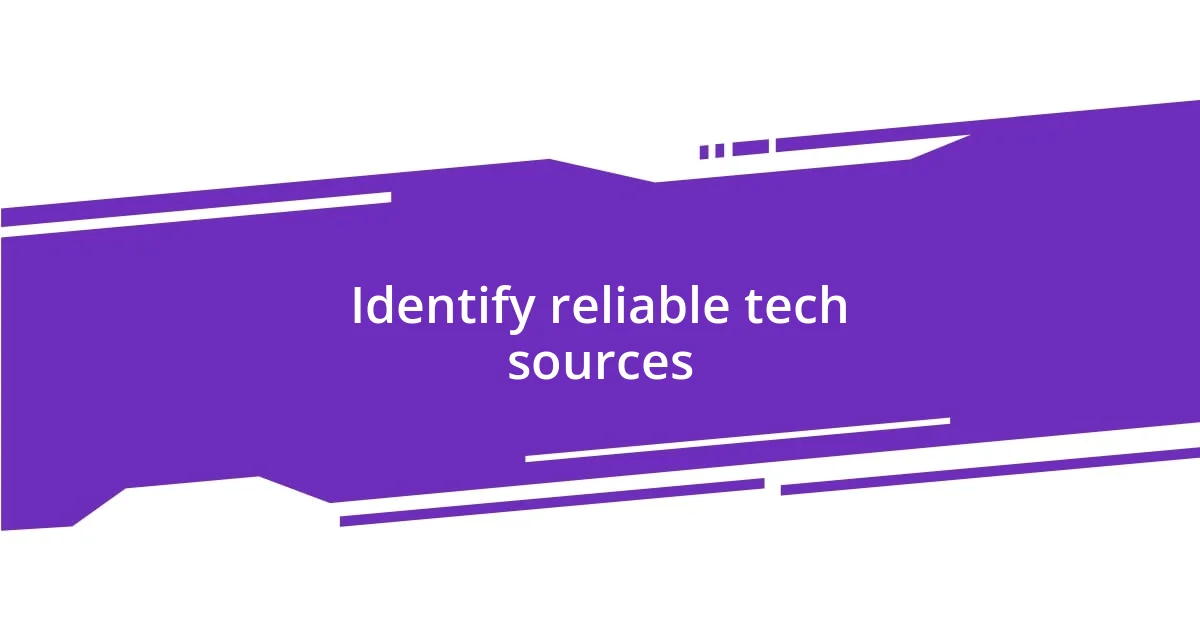
Identify reliable tech sources
When it comes to identifying reliable tech sources, I always start by checking the credibility of the authors. I often look for publications that have a history of quality reporting and feature writers who have substantial expertise in the field. For instance, I once stumbled upon a tech blog that seemed flashy but quickly realized the author had no real-world experience, which left me feeling doubtful about the information presented.
In my quest for trustworthy updates, I’ve found that major tech magazines and websites, like Wired and TechCrunch, often have rigorous editorial standards. They combine expert interviews with data-backed analysis, which gives me confidence in their reports. I often ask myself, “Does this source provide in-depth commentary, or is it just a headline?” This simple question helps me sift through the noise and focus on insights that matter.
Networking with peers also plays a crucial role in my discovery process. I remember attending a tech conference where I overheard a conversation about emerging trends from a seasoned industry professional. Their recommendations led me to some exceptional niche websites and newsletters that have since become go-to sources for me. Have you ever had a similar experience where a simple chat opened the door to a treasure trove of information? It shows the importance of community in keeping up with the fast-paced world of technology.

Subscribe to tech newsletters
Subscribing to tech newsletters has been a game changer for me. There’s something incredibly satisfying about waking up each morning to a curated list of the latest tech trends in my inbox. I’ve developed a routine of dedicating just a few minutes to skim through these newsletters over my morning coffee. It’s a delightful way to kickstart my day, and I genuinely appreciate how these insights help me stay in the loop without feeling overwhelmed.
Here are a few newsletters I recommend based on my experience:
– The Verge’s Newsletter: Great for in-depth articles about the latest gadgets and tech news.
– Techmeme: I love its fast-paced updates and clear summaries of trending stories.
– The Information: Offers in-depth analyses that really dig into the business side of tech.
– WIRED: A mix of culture and technology that fuels my creativity.
– Ben Thompson’s Stratechery: Provides insightful commentary that often makes me rethink industry trends.
These newsletters don’t just inform me; they spark conversations and ideas. One time, a piece in TechCrunch inspired me to experiment with a new app, which ended up revolutionizing my workflow. It’s this interconnectedness of ideas that helps me feel not just updated, but truly engaged in the tech community.
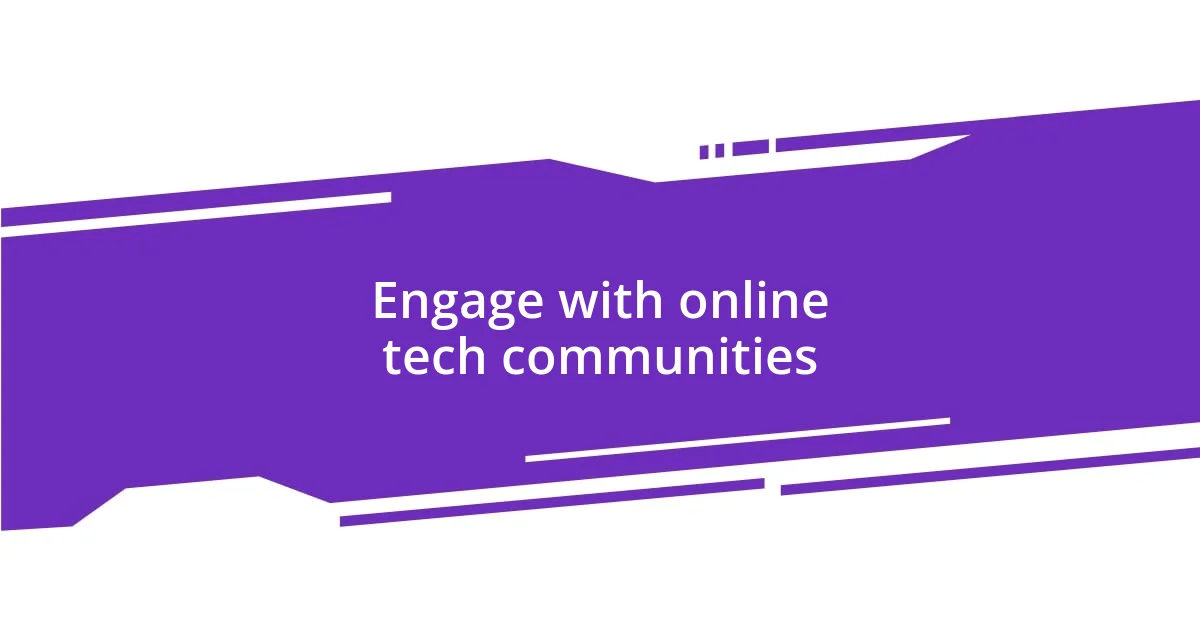
Engage with online tech communities
Engaging with online tech communities has really transformed how I approach learning about the latest trends. I frequently dive into forums like Reddit and Stack Overflow, where passionate tech enthusiasts share their knowledge, experiences, and even personal projects. I remember a fascinating thread where someone shared their journey in developing an app for mental health; it gave me fresh perspectives on the importance of tech in personal well-being.
Joining tech-related social media groups is another delightful way for me to stay connected. I often find myself in Facebook and LinkedIn groups where members share not only articles but also real-life insights and discussions on the latest tech developments. Participating in discussions has led me to resources I would have never discovered otherwise. For example, a recent chat about AI tools inspired me to explore a new software that has seriously improved my productivity.
To make the experience even better, I encourage you to engage actively. Don’t just scroll—ask questions, offer insights, and share your projects. You’d be surprised how willing community members are to help you out or collaborate. I recall posting a simple question about the latest programming language, and within minutes, I had a multitude of thoughtful responses and even a couple of new online friends. It shows the power of community; we can all learn so much from each other!
| Online Tech Communities | Benefits |
|---|---|
| Diverse discussions and real-time updates on trends. | |
| Stack Overflow | Problem-solving and coding support from experienced developers. |
| Facebook Groups | Networking opportunities and access to informal polls on trends. |
| LinkedIn Groups | Professional insights and potential mentorship. |
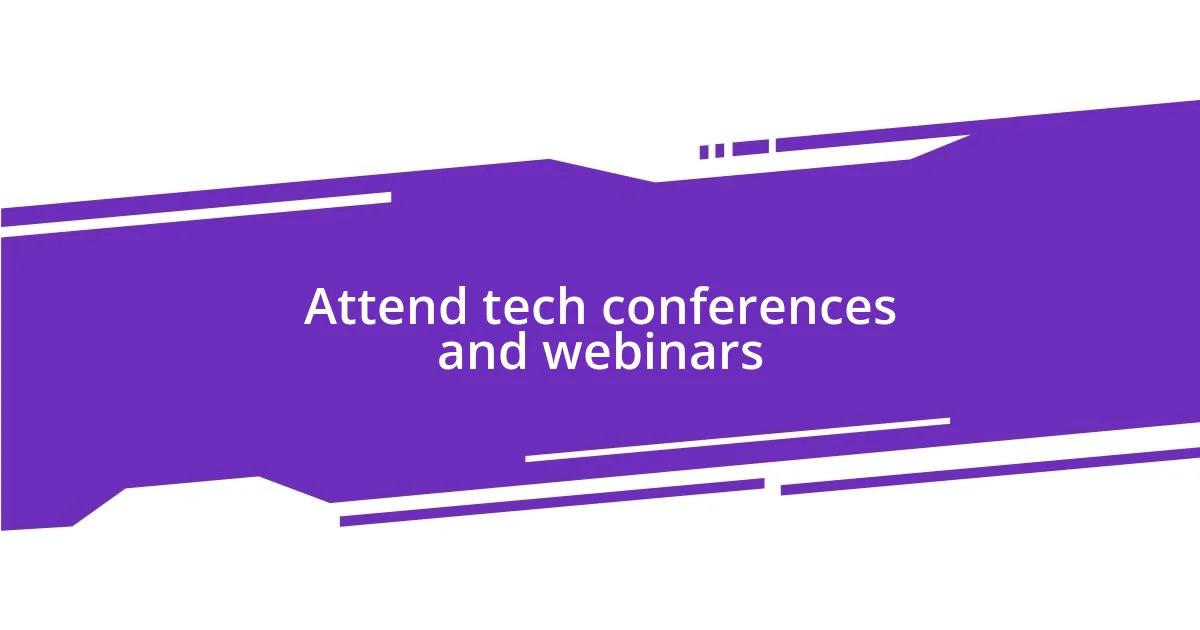
Attend tech conferences and webinars
Attending tech conferences and webinars has been one of my favorite ways to immerse myself in the latest advancements. Just recently, I participated in a virtual conference on artificial intelligence. It was thrilling to hear directly from industry leaders and innovators. I felt like I was in the front row, soaking in insights that pushed me to think beyond my usual boundaries. Have you ever felt that surge of inspiration from a keynote speaker? It’s electric!
The beauty of these events is the networking opportunities they create. A couple of years ago, I met someone at a blockchain conference who later became a mentor in my career. We’re still in touch, exchanging ideas and exploring potential collaborations. It’s incredible how a simple conversation at a conference can open doors and create lasting relationships in the tech field. When you surround yourself with like-minded individuals, you naturally cultivate a supportive environment that encourages growth and innovation.
Webinars also offer practical benefits. They tend to be more focused and accessible, allowing me to dive into specific topics without the travel hassle. I’ve attended a few that delved deep into emerging technologies like quantum computing, and each time, I’ve walked away with actionable insights. The Q&A sessions really allow me to engage directly with experts, getting answers to my burning questions. If I can learn something new and relevant, it’s always worth the time spent. Why not take advantage of these resources to enhance your own knowledge and professional growth?
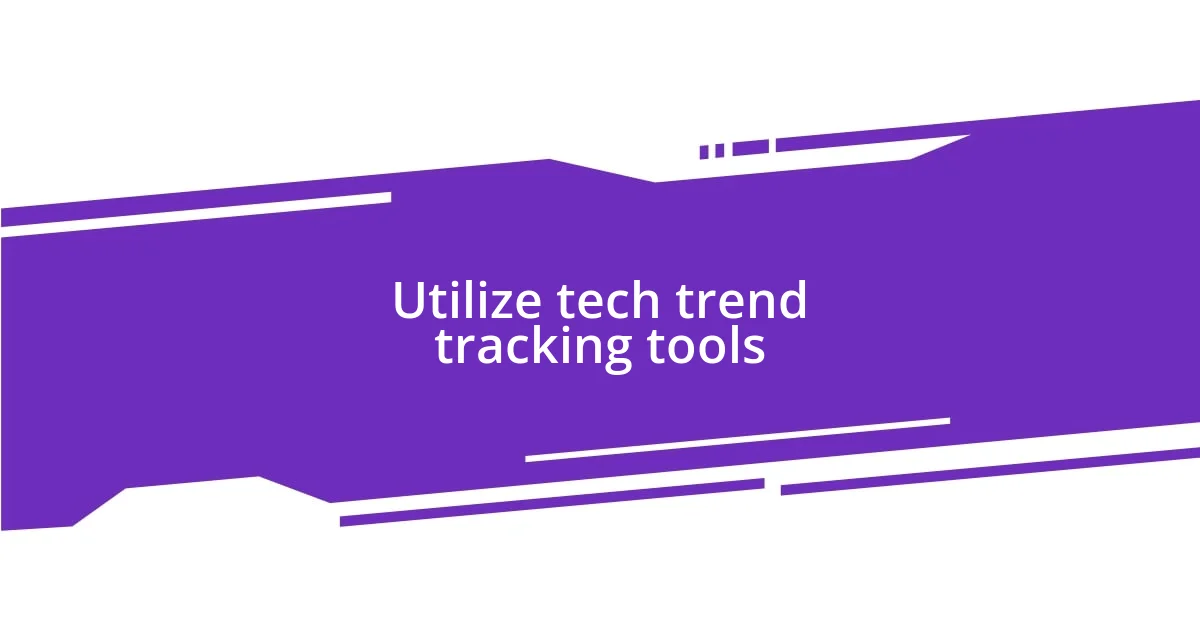
Utilize tech trend tracking tools
Utilizing tech trend tracking tools has become essential in my daily routine. I love how apps like Feedly allow me to curate content from various tech sources all in one place. Just the other day, I discovered a fascinating article on emerging fintech innovations that significantly broadened my understanding of the sector. Isn’t it amazing how a simple tool can open your eyes to new possibilities?
Another tool I find incredibly helpful is Google Alerts. With keywords tailored to my interests, I receive updates on the latest trends directly to my inbox. I remember setting it up for topics like “cloud computing” and “5G technologies.” The thrill of receiving alerts about groundbreaking developments often leads to deep dives into subjects I hadn’t previously considered. It’s like having a personal assistant searching the web for me!
Lastly, I’ve recently started using platforms like TrendWatching. They provide deep insights into consumer trends, which I find invaluable for understanding the market landscape. The reports often fuel my creativity and inspire new ideas for projects I’m working on. Have you ever felt a spark of inspiration just from a well-researched report? It can really guide your thinking in powerful ways.

Evaluate and summarize key insights
Evaluating and summarizing key insights from various sources is pivotal in my tech exploration journey. I often find that distilling information into concise takeaways helps me grasp complex ideas much more clearly. For instance, after attending a session on machine learning, I took a moment to jot down the most compelling points. It’s surprising how reviewing just a few key insights can shift my entire perspective on a topic.
I also love revisiting notes after conferences or webinars to see what stood out to me. Recently, I compiled a list of emerging trends in cybersecurity that struck me as critical. By summarizing these insights, I not only reinforce my understanding but also create a handy reference for future projects. Have you ever realized the power of looking back at your notes and seeing a theme emerge? It can truly illuminate the path forward.
Moreover, synthesizing insights from various sources allows me to spot connections I might’ve missed at first glance. For example, noticing the interplay between AI advancements and privacy concerns helped me understand the tech landscape holistically. It’s almost like piecing together a puzzle; each insight adds to the bigger picture. Reflecting on these connections fosters creativity, enabling me to leverage my knowledge in practical ways. Isn’t it fascinating how the dots connect when you take the time to evaluate and summarize?

